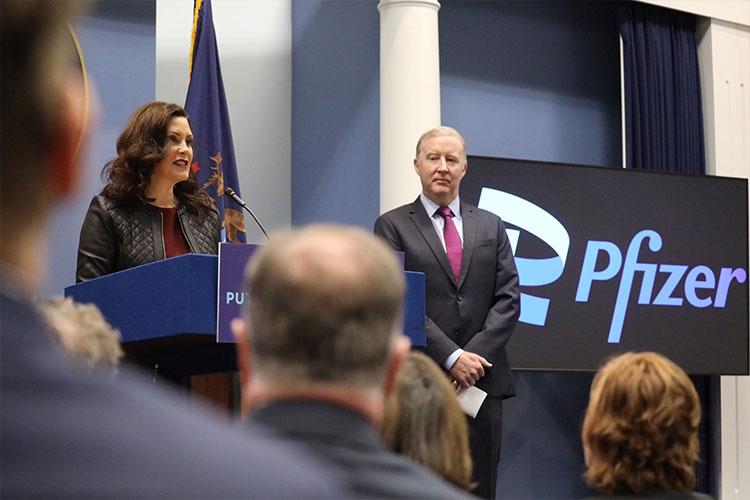
Michigan Gov. Gretchen Whitmer joined business, state, and local officials recently to announce that Pfizer Inc. will be investing $750 million at its Kalamazoo facility. The investment aims to establish the facility as one of the most technologically advanced in the world and will continue to ensure the uninterrupted supply of Pfizer medicines and vaccines. This investment builds upon the company’s initial investment of $465 million in the Kalamazoo facility and a $120 million expansion announced earlier this year.
“Today, Pfizer is making another bold bet on Michigan’s manufacturing strengths and hardworking people,” said Governor Whitmer. “This $750 million investment will expand capacity at their Kalamazoo facility, creating good-paying jobs and fostering long-term economic opportunity for Michiganders. We brought this investment home thanks to effective collaboration between the state and Pfizer, and I know that Michigan’s future is bright because we have world-leading companies, economic momentum, and the hardest working people on the planet to move us forward.”
One of Pfizer’s largest plants, the Kalamazoo facility is a global supplier of sterile injectable, liquid and semi-solid medicines, as well as active pharmaceutical ingredients, producing more than 144 products. Currently, the multi-story, 400,000-square-foot MAP production facility employs 3,000 colleagues and contractors. Pfizer’s operations in Kalamazoo County generate an estimated annual economic impact in west Michigan of $3 billion. The plant has been in operation since 1948 and has had a presence in the community through the legacy Upjohn Company since 1886.
“Since 2017, Pfizer has invested $5 billion to support the ongoing growth of our manufacturing leadership in the U.S.” said Albert Bourla, Chairman and Chief Executive Officer, Pfizer. “This expansion is part of our blueprint to grow our U.S. manufacturing base, create more manufacturing jobs, and help ensure patients everywhere can get the medicines they need.”
In June 2022, the global pharmaceutical industry leader announced it was adding 250 jobs to its Portage manufacturing facility as part of a $120 million investment to produce Paxlovid, the company’s antiviral COVID-19 pill. According to the company, the facility will be the only U.S. manufacturer of the ingredients and materials used to produce Paxlovid.
“Pfizer’s continued investment in Michigan highlights the state’s leadership in life sciences and medical device manufacturing and our commitment to growing high-wage tech jobs to strengthen economic opportunity for Michiganders,” said MEDC CEO and Michigan Strategic Fund President and Chair Quentin Messer Jr. “We’re thrilled to be celebrating Pfizer’s latest commitment in Michigan – which marks its second in 2022 – as they create good-paying jobs for our friends and neighbors here in Portage, in nearby Kalamazoo, and all throughout the Southwest Michigan region. Congratulations to the team at Pfizer. We cannot wait to see and support your continued success in 2022 and beyond.”
The investment builds on Michigan’s leadership in combatting COVID-19 since cases were first detected in March 2020, with the first U.S. doses of the Pfizer vaccine being manufactured at the Portage facility. Since December 2020, the facility has produced nearly a billion doses. In March 2021, Pfizer broke ground on one of the world’s most technically advanced sterile injectable pharmaceutical production facilities – known as Modular Aseptic Processing (MAP) – in Portage. The facility is expected to add approximately 450 new jobs in Kalamazoo County, part of a $465 million investment by the company. The project was supported by a $1-million Michigan Business Development Program-based grant approved by the Michigan Strategic Fund.
As the proud home to 275 medical device and life sciences firms, from household industry names such as Pfizer and Stryker to exciting upstarts like Tetra Therapeutics, Michigan is among the top ten in the nation for medical device manufacturing companies. The state is increasingly competitive throughout the nation for developing, testing and deploying new medical device technologies, particularly in the Southwest region of Michigan, which has five times more workers than the U.S. average in the medical device sector. To learn about Southwest Michigan’s booming medical device and life science industries, check out the video below.
Today’s news builds on a series of other life sciences and medical device investments Michigan has secured recently, including:
- Digilab investing $1.44 million and creating up to 100 life science and medical device jobs in Monroe, where it is establishing a full-service dental lab.
- Neogen Corporation is investing $71.5 million and creating 77 new jobs as well as retaining 350 jobs in Lansing, where it is constructing a state-of-the-art manufacturing and R&D facility.
- Global Life Sciences investing $430 million and creating an estimated 200 jobs in Muskegon Charter Township, where it plans to establish its first Michigan operations that will include machinery and equipment as well as lab and clean-room space.
- West Contract Manufacturing investing $6 million and creating 110 jobs in the city of Walker, where it will expand its production of injectable medicines.
- Dow, Inc. investing $150 million and retaining 800 jobs in Midland, where it is investing in its operations in order to best position itself for future growth.
In addition, global pharmaceutical leader Perrigo announced plans in 2020 to establish its North American corporate headquarters in Grand Rapids, a project that was expected to generate $44.7 million in private investment and create 170 well-paying jobs for Michigan workers.
